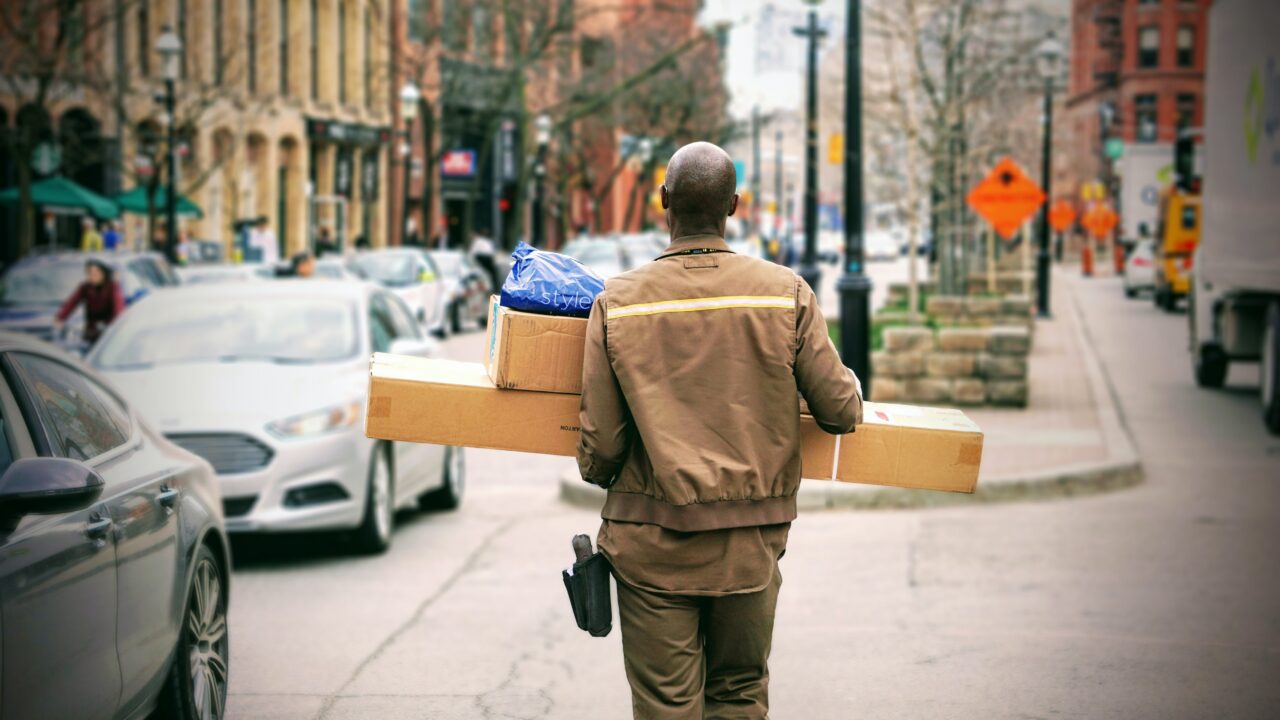As millions of Americans have suffered over the course of the COVID-19 pandemic, Amazon has emerged as a clear winner. The corporation’s stock price has swelled as independent businesses have shuttered and home-bound Americans have grown reliant on delivery services. CEO Jeff Bezos, already the world’s richest man, is now on track to become the world’s first trillionaire.
Yet the pandemic has also pulled back the curtain on how Amazon’s power is built on the exploitation of Black and brown people for profit. In the wake of protests over the murders of George Floyd, Breonna Taylor, and Ahmaud Arbery, that fact is more clear than ever.
Amazon made a show of responding to the protests, issuing a statement on a somber black background declaring, “The inequitable and brutal treatment of Black people in this country must stop.”
The irony, apparently, was lost on Amazon’s corporate leadership. If there is one company that exemplifies the exploitative nature of racial capitalism, Amazon is it.
If Amazon really wanted to stop the inequitable and brutal treatment of Black people, it could just take a look at its own operations. From its treatment of workers to its alliances with law enforcement, Amazon has built a deeply racist business model.
Workers have long raised concerns about the conditions in Amazon’s fulfillment and distribution centers, the core of its operations. In its relentless pursuit of profits, Amazon has forced the largely Black and brown workers in its warehouses to undergo unbearable brutality — peeing in bottles and working in 110+ degree heat are just two of the horror stories. It should come as no surprise that the proportion of Amazon frontline workers who are Black is more than three times the proportion of Black workers in management.
Amazon’s focus on the bottom line hasn’t waned during the COVID-19 pandemic — if anything, it’s only grown worse. It has taken direct, militant, and public worker action to get Amazon to make available gloves, masks, and hand sanitizer — and workers report that, despite company announcements, protection remains hard to come by. Perhaps worst of all, the company continues to refuse calls from workers and lawmakers to reveal how many workers have tested positive for COVID-19, putting the burden of assessing risk squarely on workers without the information they need to make meaningful decisions.
Instead of listening to workers who summon the courage to speak up, the company has gotten rid of them. Chris Smalls, a Black worker at JFK8, was unceremoniously fired just hours after leading workers in the first walkout against the company’s policies in March. A leaked document from Amazon later showed that the company planned a racist smear campaign to label him as “not smart, or articulate.” At least four more warehouse workers have been fired for speaking out. It should come as no surprise that all of them are Black.
Amazon’s failure to be transparent about the rate of COVID-19 spread in its facilities doesn’t just land hardest on Black workers — it widens the racial gap for all communities of color. Even before the pandemic, Amazon’s facilities were largely concentrated in neighborhoods of color, particularly in California’s Inland Empire. The air pollution these facilities emit raises the risk for respiratory illnesses like asthma, exacerbating the racially disparate impact of the pandemic. When workers spoke up about the risks Amazon was exposing them to, they were speaking for their communities as a whole.
If the COVID-19 crisis has shone a harsh light on Amazon’s brutality towards Black workers, the violent state-sanctioned response to the protests of the past few weeks has brought new attention to the company’s profiteering off the incarceration of Black people.
For years, Amazon has cultivated cozy relationships with law enforcement agencies around the country, largely in an effort to expand the market for its surveillance tools. Amazon owns Ring, a company that sells home surveillance products that have been widely criticized for racial bias. Ring’s facial recognition product, Rekognition, has been found to misidentify people with darker skin more often than those with lighter skin. The tool has even misidentified members of Congress as criminals, targeting Black lawmakers more than white ones. A host of racial justice groups have criticized Rekognition and demanded that Amazon stop furnishing the tools to law enforcement departments.
Yet Amazon has swept aside criticism about its surveillance tools, just as it swept aside complaints from workers. Instead, the company has aggressively moved to get police departments to adopt the technology, giving police officers discounts on Ring products and even going as far as throwing lavish Ring-sponsored parties for police. At one of these parties, employees dressed up in racist tropes of Native Americans. More than 400 law enforcement departments have now formed partnerships with Ring — including five in the Minneapolis area.
And Amazon isn’t just collaborating with local police — it’s collaborating with ICE. Through its cloud-computing AWS software, Amazon earns millions through support to companies like Palantir that help ICE to track, monitor, and deport immigrants. Even as the Trump administration has cracked down on immigrant communities, Amazon has shown no willingness to end its collaboration with the agency.
Given Amazon’s close ties to the shock troops of white supremacy, it should come as no surprise that the company has done virtually nothing to stop the rampant sale of hate symbols and products on its site, including Confederate and Nazi imagery. By providing a platform for those products, Amazon has helped facilitate the spread of white nationalism — and ignored calls from those demanding that the sellers of these products be flagged .
So what can be done? Given the scale of the problem, reforming Amazon can seem hopeless, or at least Sisyphean. But there are growing models and movements for change. Organizing groups like MediaJustice and Color of Change, for example, have pressured Amazon to cut ties with local police departments and ICE as well as defund police contracts with Ring and other makers of surveillance tools. Workers and consumers have also begun to hold Amazon accountable for labor, third-party-seller, and price gouging abuses. Throughout the COVID-19 pandemic, state attorneys general have stepped in to demand Amazon abide by rules and regulations. This should be a standard practice.
But we can go much further. Given Amazon’s overwhelming dominance of the marketplace, to address the racism at the core of the company’s operations, we should think about demanding a wholesale restructuring of Amazon. There have long been calls to treat Amazon like a public utility rather than a private company. More assertive calls for nationalizing Amazon date back at least to the HQ2 fights in New York, with organizers arguing that public dollars should be used for public needs, not private gain. As Amazon is increasingly seen as an essential service, the logic of nationalizing the company is becoming clearer.
Other countries have begun to exercise more stringent oversight. A French court, for example, found Amazon had failed to protect public health on the basis of worker-supplied facts and ordered the company to comply with its own announcement of plans to sell essential items only. In response, Amazon shut down all operations in the country until finally compromising with the unions on May 16.
It’s clear that Amazon needs to be a central focus of our organizing in the months and years to come. A fight against Amazon is a fight against the very essence of racial capitalism. Should a company be allowed to exploit Black and brown people for profit and power with impunity? The past two months have shown the racism fueling Amazon’s rise, but it will be up to all of us to build an alternative vision — and answer that question with a hearty NO!

